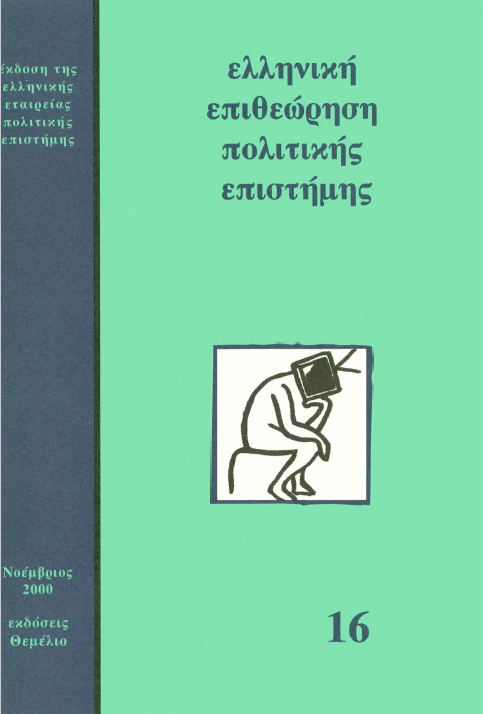Ο ρόλος του κράτους στα ραδιοτηλεοπτικά μέσα επικοινωνίας: Μύθος καί πραγματικότητα
Περίληψη
Το άρθρο καταδεικνύει το μύθο πίσω από την αντίληψη της κρατικής ραδιοφωνίας-τηλεόρασης ως «δημόσιας κοινωνικής υπηρεσίας» αναπτύσσοντας μια ερμηνεία των κρατικών μέσων η οποία εδράζεται στη θεώρηση του σύγχρονου παρεμβατικού κράτους όχι ως διαχειριστή της οικονομίας, αλλά ως νέο φορέα του κεφαλαίου, ως κρατικό κεφάλαιο το οποίο αντικαθιστά ή ανταγωνίζεται τον παραδοσιακό φορέα τις ιδιωτικές επιχειρήσεις. Ιδιαίτερη έμφαση δίνεται στην ανάλυση των μηχανισμών που αποκαλύπτουν τον κεφαλαιοκρατικό χαρακτήρα των δημόσιων οργανισμών «κοινής ωφελείας», καθώς και την εγγενή ιδιοτέλεια των στελεχών τους. Τέλος, υποστηρίζεται ότι η έκταση και η συγκεκριμένη μορφή που προσλαμβάνει ο κρατικός έλεγχος του ραδιοτηλεοπτικού πεδίου σε κάθε χρονική περίοδο ή/και κοινωνικό σχηματισμό σε τελική ανάλυση καθορίζεται από την ισορροπία δυνάμεων μεταξύ κρατικού και ιδιωτικού κεφαλαίου, όπως αποδεικνύουν τα γεγονότα που οδήγησαν στην επικράτηση της ιδιωτικής πρωτοβουλίας στις ΗΠΑ, στο κρατικό μονοπώλιο στις ευρωπαϊκές κοινωνίες μέχρι τα τέλη της δεκαετίας του ’70, και στην απορύθμιση και ιδιωτικοποίηση του πεδίου από το 1980 και μετά.
Λεπτομέρειες άρθρου
- Πώς να δημιουργήσετε Αναφορές
-
Σεραφετινίδου Μ. (2017). Ο ρόλος του κράτους στα ραδιοτηλεοπτικά μέσα επικοινωνίας: Μύθος καί πραγματικότητα. Ελληνική Επιθεώρηση Πολιτικής Επιστήμης, 16, 108–146. https://doi.org/10.12681/hpsa.15189
- Ενότητα
- Άρθρα

Αυτή η εργασία είναι αδειοδοτημένη υπό το CC Αναφορά Δημιουργού – Μη Εμπορική Χρήση – Παρόμοια Διανομή 4.0.
Οι συγγραφείς θα πρέπει να είναι σύμφωνοι με τα παρακάτω: Οι συγγραφείς των άρθρων που δημοσιεύονται στο περιοδικό διατηρούν τα δικαιώματα πνευματικής ιδιοκτησίας επί των άρθρων τους, δίνοντας στο περιοδικό το δικαίωμα της πρώτης δημοσίευσης. Άρθρα που δημοσιεύονται στο περιοδικό διατίθενται με άδεια Creative Commons 4.0 και σύμφωνα με την οποία μπορούν να χρησιμοποιούνται ελεύθερα, με αναφορά στο/στη συγγραφέα και στην πρώτη δημοσίευση για μη κερδοσκοπικούς σκοπούς και με δικαίωμα τροποποίησης μόνο με παρόμοια διανομή (αν αναμείξετε, τροποποιήσετε, ή δημιουργήσετε πάνω στο υλικό, πρέπει να διανείμετε τις δικές σας συνεισφορές υπό την ίδια άδεια όπως και το πρωτότυπο).


